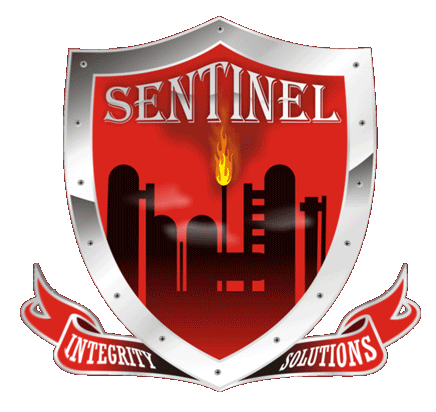

DELIVERING SAFE, COST EFFECTIVE, TURN-KEY INSPECTION SOLUTIONS
Asset Integrity Management (AIMS)

Sentinel Integrity’s Asset Integrity Management Services Division (AIMS) uses a continuous improvement process to help our clients optimize in-house and contract resources ensuring their mechanical integrity program is focusing on those assets representing the highest risk.
Consistency and repeatability of application are critical to sustaining an effective mechanical integrity program, regardless of whether you are using a time-based or risk-based approach. Sentinel’s subject matter experts are prepared to help with every aspect of your mechanical integrity program by providing training o to your staff, executing the implementation and ever-greening you r program on your behalf.
Mechanical Integrity
Mechanical Integrity (MI) is a term that refers to the process of managing process equipment. This is done to ensure that it is designed correctly, and performs safely. Mechanical Integrity covers everything from the design and construction of a piece of equipment, all the way to its installation and operation.
Having a proper Mechanical Integrity Program can lead to several benefits for a facility, including better equipment reliability and fewer failures, more efficient maintenance, better compliance to government regulations, and lower operating costs. Likewise, Mechanical Integrity plays a large role in the Occupational Safety and Health Administration's (OSHA's) CFR 29 1910.119 Process Safety Management of Highly Hazardous Chemicals standard and with the EPA’s Risk Management Program (RMP).
Risk Based Inspection (RBI)
The petrochemical industry constantly seeks cost-effective solutions that improve the safety and reliability of their facilities. Adopted first in the API 570 Piping Inspection Code, the use of API 580 / API 581 risk assessments have been implemented by numerous petrochemical facilities, and there is clear justification for its use and value when properly applied. Many facilities today now utilize a combination of both time-based and risk-based mechanical integrity programs.
Risk-based inspections (RBI) have been shown to provide significant benefits through mechanical integrity and turnaround cost optimization, as well as overall risk exposure reduction. Typical return on investment over a four-year turnaround cycle is on the order of 4:1. The cost savings do not always come from reduced inspection costs, but savings can also be achieved due to reduced mechanical expenses.
Sentinel Integrity Solutions verifies and evaluates the precise data needed to perform an objective, quantitative risk assessment. We optimize this process by exporting data from a facility’s current mechanical integrity software and importing the data into virtually any risk assessment software.
Our risk assessments identify, evaluate and prioritize damage mechanisms that are likely to occur in process equipment. The risk assessment then accurately predicts the likelihood and consequence of failure for fixed equipment.
Sentinel Integrity Solutions can also assist our clients in keeping their risk assessments evergreen. This includes the preparation of Management of Change Work Processes to ensure that the RBI software files are kept updated at all times. We train the nested or resident inspectors updating the analysis and inspection. The facility can understand in real time where the high risks are, what they must do to reduce them and what the savings will be.

